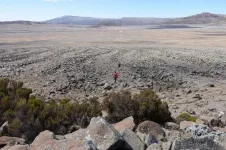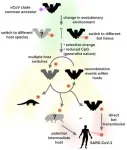Study finds cancer cells may evade chemotherapy by going dormant
2021-03-12
(Press-News.org) Cancer cells can dodge chemotherapy by entering a state that bears similarity to certain kinds of senescence, a type of "active hibernation" that enables them to weather the stress induced by aggressive treatments aimed at destroying them, according to a new study by scientists at Weill Cornell Medicine. These findings have implications for developing new drug combinations that could block senescence and make chemotherapy more effective.
In a study published Jan. 26 in Cancer Discovery, a journal of the American Association for Cancer Research, the investigators reported that this biologic process could help explain why cancers so often recur after treatment. The research was done in both organoids and mouse models made from patients' samples of acute myeloid leukemia (AML) tumors. The findings were also verified by looking at samples from AML patients that were collected throughout the course of treatment and relapse.
"Acute myeloid leukemia can be put into remission with chemotherapy, but it almost always comes back, and when it does it's incurable," said senior author Dr. Ari M. Melnick, the Gebroe Family Professor of Hematology and Medical Oncology and a member of the Sandra and Edward Meyer Cancer Center at Weill Cornell Medicine. "A longstanding question in the field has been, 'Why can't you get rid of all the cancer cells?' A similar question can be posed for many other types of aggressive cancer in addition to AML."
For years, cancer researchers have studied how tumors are able to rebound after they appear to be completely wiped out by chemotherapy. One theory has been that because not all cells within a tumor are the same at the genetic level--a condition called tumor heterogeneity--a small subset of cells are able to resist treatment and begin growing again. Another theory involves the idea of tumor stem cells--that some of the cells within a tumor have special properties that allow them to re-form a tumor after chemotherapy has been given.
The idea that senescence is involved does not replace these other theories. In fact, it could provide new insight into explaining these other processes, Dr. Melnick said.
In the study, the researchers found that when AML cells were exposed to chemotherapy, a subset of the cells went into a state of hibernation, or senescence, while at the same time assuming a condition that looked very much like inflammation. They looked similar to cells that have undergone an injury and need to promote wound healing--shutting down the majority of their functions while recruiting immune cells to nurse them back to health.
"These characteristics are also commonly seen in developing embryos that temporarily shut down their growth due to lack of nutrition, a state called embryonic diapause," Dr. Melnick explained. "It's not a special process, but normal biological activity that's playing out in the context of tumors."
Further research revealed that this inflammatory senescent state was induced by a protein called ATR, suggesting that blocking ATR could be a way to prevent cancer cells from adopting this condition. The investigators tested this hypothesis in the lab and confirmed that giving leukemia cells an ATR inhibitor before chemotherapy prevented them from entering senescence, thereby allowing chemotherapy to kill all of the cells.
Importantly, studies published at the same time from two other groups reported that the role of senescence is important not just for AML, but for recurrent cases of breast cancer, prostate cancer and gastrointestinal cancers as well. Dr. Melnick was a contributor to one of those other studies.
Dr. Melnick and his colleagues are now working with companies that make ATR inhibitors to find a way to translate these findings to the clinic. However, much more research is needed, because many questions remain about when and how ATR inhibitors would need to be given.
"Timing will be very critical," he said. "We still have a lot to work out in the laboratory before we can study this in patients."
INFORMATION:
Dr. Cihangir Duy, a former postdoctoral fellow in Dr. Melnick's lab, was the study's first author. Dr. Duy now leads his own lab at Fox Chase Cancer Center in Philadelphia.
Dr. Ari Melnick has been a paid consultant for KDAC Therapeutics, Epizyme, and Constellation Pharmaceuticals.
ELSE PRESS RELEASES FROM THIS DATE:
2021-03-12
A study of the relationship between temperature and yields of various rice varieties, based on 50 years of weather and rice-yield data from farms in the Philippines, suggests that warming temperatures negatively affect rice yields.
Recent varieties of rice, bred for environmental stresses like heat, showed better yields than both traditional rice varieties and modern varieties of rice that were not specifically bred to withstand warmer temperatures. But the study found that warming adversely affected crop yields even for those varieties best suited to the heat. Overall, the advantage of varieties bred to withstand increased heat was too small to be statistically significant.
One of ...
2021-03-12
Intake of a high-fat diet leads to an increased risk for obesity, type 2 diabetes, cardiovascular diseases and fatty liver. A study in mice from Karolinska Institutet in Sweden shows that it is possible to eliminate the deleterious effects of a high-fat diet by lowering the levels of apolipoprotein CIII (apoCIII), a key regulator of lipid metabolism. The study is published in the journal Science Advances.
Increased levels of the protein apoCIII are related to cardiovascular diseases, insulin resistance and type 2 diabetes. Researchers at the Rolf Luft Research ...
2021-03-12
New research led by the University of Cambridge has found rare evidence - preserved in the chemistry of ancient rocks from Greenland - which tells of a time when Earth was almost entirely molten.
The study, published in the journal Science Advances, yields information on a important period in our planet's formation, when a deep sea of incandescent magma stretched across Earth's surface and extended hundreds of kilometres into its interior.
It is the gradual cooling and crystallisation of this 'magma ocean' that set the chemistry of Earth's interior - a defining stage in the assembly of our planet's structure and the formation of our early atmosphere.
Scientists know that catastrophic impacts during the formation of the Earth and Moon would have generated ...
2021-03-12
As the driver of global atmospheric and ocean circulation, the tropics play a central role in understanding past and future climate change. Both global climate simulations and worldwide ocean temperature reconstructions indicate that the cooling in the tropics during the last cold period, which began about 115,000 years ago, was much weaker than in the temperate zone and the polar regions. The extent to which this general statement also applies to the tropical high mountains of Eastern Africa and elsewhere is, however, doubted on the basis of palaeoclimatic, geological and ecological studies at high elevations.
A research team led by Alexander Groos, Heinz Veit (both from the Institute of Geography) and Naki Akçar (Institute of Geological Sciences) at the University ...
2021-03-12
How much did SARS-CoV-2 need to change in order to adapt to its new human host? In a research article published in the open access journal PLOS Biology Oscar MacLean, Spyros Lytras at the University of Glasgow, and colleagues, show that since December 2019 and for the first 11 months of the SARS-CoV-2 pandemic there has been very little 'important' genetic change observed in the hundreds of thousands of sequenced virus genomes.
The study is a collaboration between researchers in the UK, US and Belgium. The lead authors Prof David L Robertson (at the MRC-University of Glasgow Centre for Virus Research, Scotland) ...
2021-03-12
Informing how COVID-19 response plans may incorporate digital contact tracing, a model of COVID-19 spread within a simulated French population found that if about 20% of the population adopted a contact tracing app on their smartphones, an outbreak could be reduced by about 35%. If more than 30% of the population adopted the app, the epidemic could be suppressed to manageable levels. Jesús Moreno López and colleagues note that the effectiveness of digital contact tracing would depend on a given population's level of immunity to the virus; the intervention alone would be unable to suppress a COVID-19 epidemic where transmission - and especially asymptomatic transmission - remains high. While many countries have implemented ...
2021-03-12
DURHAM, N.C. -- If you binged on high-calorie snacks and then spent the winter crashed on the couch in a months-long food coma, you'd likely wake up worse for wear. Unless you happen to be a fat-tailed dwarf lemur.
This squirrel-sized primate lives in the forests of Madagascar, where it spends up to seven months each year mostly motionless and chilling, using the minimum energy necessary to withstand the winter. While zonked, it lives off of fat stored in its tail.
Animals that hibernate in the wild rarely do so in zoos and sanctuaries, with their climate controls and ...
2021-03-12
Decades of feminist gains in the workforce have been undermined by the COVID-19 pandemic, which has upended public education across the United States, a critical infrastructure of care that parents -- especially mothers -- depend on to work, according to new research from Washington University in St. Louis.
The research, published in Gender & Society, draws on new data from the Elementary School Operating Status (ESOS) database to show that the gender gap between mothers and fathers in the labor force has grown significantly since the onset of the pandemic in states where schools primarily offered remote instruction.
And if these circumstances continue, it could deliver ...
2021-03-12
Sound sleep plays a critical role in healing traumatic brain injury, a new study of military veterans suggests.
The study, published in the Journal of Neurotrauma, used a new technique involving magnetic resonance imaging developed at Oregon Health & Science University. Researchers used MRI to evaluate the enlargement of perivascular spaces that surround blood vessels in the brain. Enlargement of these spaces occurs in aging and is associated with the development of dementia.
Among veterans in the study, those who slept poorly had more evidence of these enlarged spaces and more post-concussive symptoms.
"This has huge implications for the armed forces as well as civilians," said lead author Juan Piantino, M.D., MCR, assistant professor of pediatrics (neurology) in the ...
2021-03-12
Astronomers have painted their best picture yet of an RV Tauri variable, a rare type of stellar binary where two stars - one approaching the end of its life - orbit within a sprawling disk of dust. Their 130-year dataset spans the widest range of light yet collected for one of these systems, from radio to X-rays.
"There are only about 300 known RV Tauri variables in the Milky Way galaxy," said Laura Vega, a recent doctoral recipient at Vanderbilt University in Nashville, Tennessee. "We focused our study on the second brightest, named U Monocerotis, which is now the first of these systems from which X-rays have been detected."
A paper describing the findings, led by Vega, was published in The Astrophysical Journal.
The system, called U ...
LAST 30 PRESS RELEASES:
[Press-News.org] Study finds cancer cells may evade chemotherapy by going dormant




